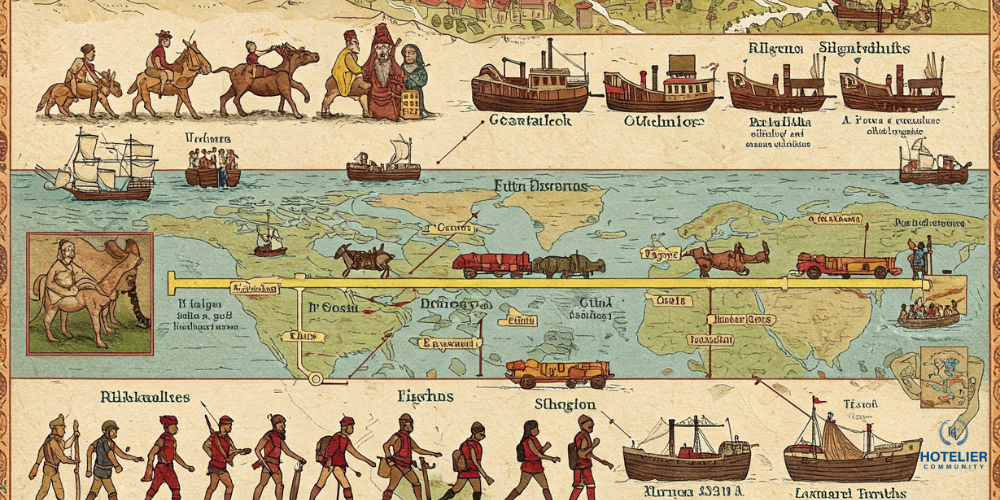Humans have always been on the move. From the earliest migrations in search of sustenance to today’s globalized exploration, the desire to travel is woven into the fabric of our existence. This article explores the fascinating history of travel, charting its evolution from rudimentary journeys to the sophisticated and interconnected world we know today, highlighting the revolutions that have shaped this dynamic industry.
The Dawn of Exploration:
Our story begins long before recorded history, with early humans traversing vast distances on foot, following animal migrations and seeking new territories. These journeys, driven by necessity, laid the groundwork for future exploration. As civilizations emerged, travel became more organized. Ancient Egyptians navigated the Nile, while the Greeks and Romans established trade routes across the Mediterranean. The Silk Road, a network of pathways spanning continents, became a conduit for goods, ideas, and cultural exchange, connecting East and West and fostering a nascent form of international travel.
Wheels, Sails, and the Rise of Infrastructure:
The invention of the wheel and the development of sailing technology were pivotal moments. Wheeled vehicles facilitated overland travel, while ships enabled exploration and trade across vast oceans. The Romans, renowned for their engineering prowess, built an extensive network of roads that connected their vast empire, enabling efficient movement of people and goods. These advancements in transportation infrastructure were crucial in making travel more accessible and efficient.
The Grand Tour and the Rise of Tourism:
The 17th and 18th centuries witnessed the “Grand Tour,” a rite of passage for wealthy young Europeans. These extended journeys across the continent, focusing on art, culture, and history, marked an early form of tourism. While limited to the elite, the Grand Tour foreshadowed the future of leisure travel.
The Industrial Revolution: A Transformative Force:
The Industrial Revolution unleashed a wave of innovation that revolutionized travel. Steam power led to the development of trains and steamships, dramatically reducing travel time and cost. Suddenly, long-distance journeys became attainable for a wider segment of the population. Thomas Cook’s pioneering package tours in the 19th century democratized travel further, laying the foundation for the modern tourism industry.
The 20th Century: Flight and the Shrinking World:
The 20th century witnessed the most dramatic transformation in travel history: the invention of the airplane. Suddenly, continents were no longer separated by vast oceans but by mere hours of flight. Air travel not only shrank the world but also created new possibilities for both business and leisure travel. The rise of the automobile further expanded travel options, giving individuals greater freedom and flexibility.
The Digital Revolution and the Information Age:
The late 20th and early 21st centuries saw the advent of the digital revolution, which profoundly impacted the travel industry. The internet and mobile technology have empowered travelers with unprecedented access to information, booking platforms, and travel services. Online travel agencies (OTAs), metasearch engines, and review sites have transformed how people plan and book their trips.
The Modern Landscape and Future Horizons:
Today, travel is a global phenomenon. Millions of people crisscross the globe daily, driven by a multitude of motivations: business, leisure, adventure, cultural immersion, and more. The industry continues to evolve, adapting to changing traveler preferences, technological advancements, and global events. Sustainability, responsible tourism, and personalized experiences are becoming increasingly important.
Looking ahead, the future of travel promises even more innovation. We can anticipate further integration of technology, with AI, virtual reality, and the metaverse potentially transforming how we experience destinations. Space tourism, while still in its infancy, could become a reality for a wider audience. The travel industry will continue to adapt and innovate, driven by the enduring human desire to explore, connect, and experience the world.
From the first footsteps of our ancestors to the potential of interplanetary travel, the history of travel is a testament to human ingenuity and our insatiable curiosity about the world around us. It’s a story that continues to unfold, promising exciting new chapters in the years to come.


